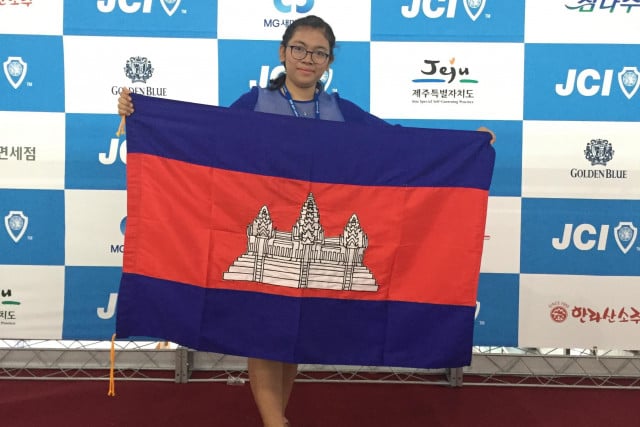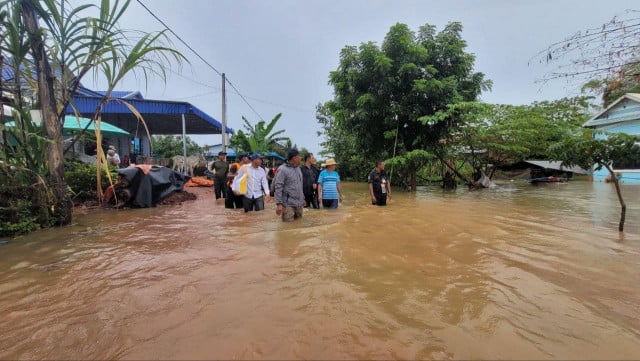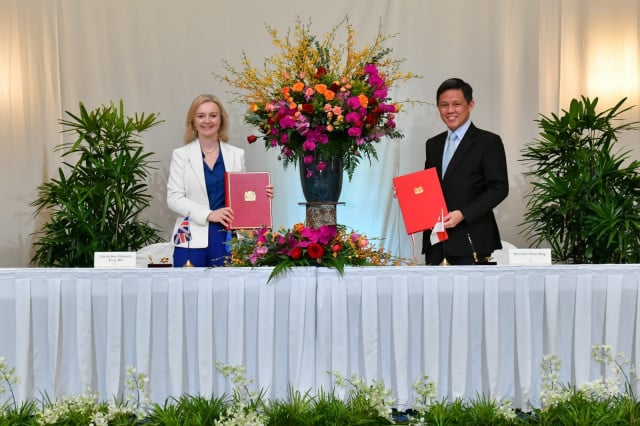Stage Fright Adds to Youth Debate Challenges

- By Ky Chamna
- November 14, 2022 9:00 AM
PHNOM PENH – Sweaty palms, shaky hands, rapid heartbeat and anxiety are common for many people who have to speak public, even for champion debater Cheng Ousa.
As a Transparency International Cambodia Youth Debate Competition champion, a winner of Model Prime Ministerial Debate in 2022 and more, Ousa had her fears when she started debating.
However, she has ways to turn worrisome moments into joyful ones.
The co-founder of Khemara English Debate Society, a youth-led initiative which aims to promote debate culture among high school students, shares her experience and tips in overcoming fear in debates.
Ky Chamna: Why do some people fear debating?
Cheng Ousa: I believe that there are two main reasons.
First, it is how we see debates. In the vast majority of instances, we see aggressive debates in which people use intimidating words or analogies to rebut each other’s speeches and to win the debate.
Whenever we go to watch a debate tournament or a showcase, it is very common to find the aggressive debaters who speak with a loud voice and strong negative gestures.
I also found it very intimidating at first because I think that we should respect each other without having to resort to using harsh voices or words.
However, after being exposed to debates, I realized that this is just one style debaters can use. Not all debaters are aggressive and speak loudly on stage.
There are also debaters who used a normal passionate tone rather than an aggressive tone which I find very attractive as they can keep our interest in their speeches.
It is also important to note that we are debating ideas provided by the other debater. Debaters do not look down on other debaters’ looks, educational backgrounds, race, or personalities. There is a clear distinction between looking down on someone and debating ideas.
Second, debating can be very fearful because we are arguing about ideas on the platform where there are a group of people watching us, namely judges, fellow teammates, opposition sides, and the audience.
Debaters cannot just read their script from home. They have to use all four language skills when they are debating. These are reading, listening, writing, and speaking. Debaters have to read before the actual debate to find sources of information and concrete cases.
Debaters have to listen carefully during the debate so that they know what their opponent is talking about. Debaters also have to write carefully and selectively on what points to rebut and respond.
Lastly, debaters also have to speak while reflecting on their points and their team’s stance. By the end of the day, debates can be a fierce sport of words that require our consistent attention.
Ky Chamna: What are some of the thing that fear can do to a debater, either on stage or behind the scenes?
Cheng Ousa: There are two bad consequences of fear in debates.
First, it is behind the scenes. Debaters will be too nervous to prepare for the debate as they are scared. In many circumstances, we find debaters’ hands shaking before it starts. Debaters may sweat profusely. They may forget what they have prepared. Negative thoughts such as “what if I make a mistake?” or “what if I freeze on stage?” and many more can be at the back of debaters’ minds.
When I first stated debating, I could not eat anything before debate competitions because I knew that I would vomit it all. So even if the competition would take a whole day, I would rather eat after the competition.
Second, is on stage. Fear can make them freeze or be caught off guard by the opposition team. Debating can be very harsh because of the words used by debaters. I used to encounter a male debater who cried afterwards because their opponent used strong negative words to crush the team’s argument.
Their team undoubtedly lost and they told me they were humiliated by the opposition team. This can happen in general debates as well because some debaters can be very smart and creative in using language to undermine the opposition team.
Ky Chamna: What motivates some people who fear debating to test themselves and take part anyway?
Cheng Ousa: I strongly believe that everyone is a debater in their life and their everyday activities. When making a decision, one must decide whether they go for option A or option B. We also use debating skills when we try to convince our parents to let us go out with our friend.
All of us use debating skill every day to convince, to persuade, to point out, and to elaborate our ideas. Therefore, it is very crucial for us to know how to debate. Having establish this, there are two ways to motivate people to test themselves and join debates.
First, it is for experience. “We would not know if we do not try it” is one of my favorite mottos. We only live once anyway. How much worse can it be just because we want to give debating a try?
Second, there are so many benefits resulting from debating. One, it is the friendships that we make with our teammates as well as with other teams. We can also learn from their good techniques.
Debating is a life-long journey and everyone has their own style. This is why I find debating refreshing as there will always be new skills we can learn. Some debaters like to use questions, some debaters like to use an analogy, and some even use advanced words.
For example, one of the phrases that I have learned from debaters from IFL Debate Club is “I am very disappointed in your argument in which you argue…”. I used this sentence from time to time to rebut the opponent’s argument.
Two, it is the four language skills. It does not matter whether debaters are debating in English or Khmer language. Debating helps with our language skill dramatically as, during the debate, we have to use all four skills in stressful circumstances.
Third, it is the intensive knowledge that we get from each debate round. Debating is much more than just a presentation of statistics and facts; debate is about how we analyze the issues, reasons, benefits and impacts that we can get from each side of both houses. Debate motions cover wide ranges of topics from environment, to international relations, from societal issues to family issues. As a dual degree holder who has been debating since I was a sophomore, I have been using debating skills for writing answers on my paper, presenting my point in the presentation, learning the knowledge and challenging my teacher as well.
Fourth, debates naturally build debaters' emotional resilience as debates have always put us in a stressful situation in which we would be looked down or challenged by different people. I have always been the subject of bullying since I was a kid because I was very talkative.
People would tell me to shut up countless times. One of the recent incidents that I encounter is this year in which a person who has never known me before told me that he did not like my speech since my voice could make him have a heart attack.
This is very offensive as my speech was barely an answer to my teacher’s question in an online class. I would have cried my heart out hearing this, but as a debater, this is not the first time that I heard such a bad word from someone.
I told myself to calm down and walk away because that person does not deserve to be my friend anyway. Why should I feel hurt by their speech, when they did not give me the respect that I deserve? I just smiled and ignore this message.
This is why debates do not only promote critical thinking skills, but they also help you with your education and personal growth.
Ky Chamna: As a trainer, how do you deal with candidates’ fear of debate?
Cheng Ousa: This is a challenging question as debate style is not fixed for everyone, and everyone has their own unique style. Although debaters have to find their own criteria and structures, trainers can use several drills to help debaters move forward.
First, it is the truth of debate. Before I began the rigorous training for the debate, I always tell my students about the actuality of debate. Debate can be exhausting and debaters have to be persistent as debate can never end within just a specific time period.
People can debate regardless of their age. This is why debating is a life-long journey. The first step is even tougher as normal people have never experienced such an intense atmosphere. This is the structure of training.
First, I began with three sets of foundations focusing on “What is Debate and its structure”, “Argument” and “Rebuttal”. Then, we will go for video watching some of the famous debate speeches so that the debaters get a hint of what the debate would look like. Lastly, debaters have to debate within a limited time of preparation with ongoing controversial issues all around the world.
Second, besides telling them the truth and sharing my experience of debate, I also use different drills to have debaters train for each different motion and skill. For debaters who are shy and have weak voices, I would make that person stand far away from us and make them do the speech while asking their teammates and opponent if they can hear the speech. This would encourage the debaters to speak loudly as well.
Third, practice makes perfect. Debaters are highly encouraged to practice as much as possible either on their own in front of the mirror or with a friend.
Fourth, feedback. Not only do we give feedback on the content matters, but we do provide comments on their style, language use, and structure of the speech. We also keep some time for personal feedback in private so that debaters have a chance to ask privately about their own mistake and what to improve.
Fifth, watching different debate videos either a debate tournament or a workshop on debate can help extend their knowledge even further. We also analyze the speech of debaters from videos and see what can be done to make the speeches better.
Ky Chamna: What kind of attitude makes a person a good debater?
Cheng Ousa: Anyone can become a debater as long as they are passionate and willing to learn as much as possible. Extensive reading skills is a plus as it can help debaters to be prepared for different motion. Moreover, as long as they are open-minded and not narrow-minded, they can become debaters who can always keep on improving and learning.
The debaters in my cycle are of many types, I am more of a passive-aggressive debater, while most of my friends are calm debaters who use their speech in a calm manner. We called them as “kill the opponent with calmness”. Moreover, there are debaters who like to use quotes, analogies, or questions as the structure of the debate.
By the end of the day, we are our own debaters. We have our own style and structure which make use uniquely different from others. So regardless of whether you are an introverted person or an extroverted person or both, you can always become a debater who knows how to put reasons and make a point. This is why I see debates as an inclusive platform in which everyone regardless of gender, and age can communicate and interact with one another.
Ky Chamna: You have travelled to different corners of the world to debate. What do you think of the proficiency of Cambodian debaters in the past several years?
Cheng Ousa: I have been debating for five years and I must say that I am euphoric about the dramatic improvement of the debate culture in Cambodia. Four years ago, trying to join debate competitions was very difficult as not many people know about debates or many people had negative views on debaters.
There were people out there who think of debaters as aggressive humans who play with words as if they are the lifelong enemy of the other teams. In 2019, there were only four tournaments in Phnom Penh namely: 16th IFL Debate Forum, JCI Debating Competition, Cam-Debate, and National Youth Debate on Human Rights. Three of which I joined and gained the title of champion except for Cam-Debate, this number was very small in comparison to what our neighboring countries have.
Now, there are many competitions hosted by Ministry of Education Youth and Sport, by Transparency International Cambodia, by USAID, and by many other non-governmental organizations and youth-led organizations.
Even my organization manages to host one debate competition as well under the name “KEDS Rookie Debate Competition” in which we expose high school and secondary school students to debates.
Many people now are keen to know debaters much more than before as well. I must say that I am very proud to announce that I am a debater whenever I introduced myself to new people.
I am very hopeful that Cambodia will be a society of debaters who know critical thinking and analyzing skills. Not only will Cambodia become a country of global-mindset debaters, but Cambodia will also have radical generations who are willing to reason rather than blindly believe different sources of information.
Ky Chamna: What are some of your favorite mottos that you love to tell yourself or your trainees as a way of making encouragement during debate?
Cheng Ousa: Now, this is my favorite part of the questions. I would like to divide the answer into two parts. The quotes that I mostly told myself are provided as below since I also have time when I feel so down from debate tournaments or by the people around me who asked me to stop debate due to various reasons.
“Debate is my happy place; it is where I can be whoever I want to be”. This is completely true for me and this quote touched my heart deeply. In society, each gender is expected to act in a certain way. However, whenever I am on the stage, I am not just Ousa. I can be a Prime Minister of the proposition side in which I have to support the motion whether I agree to it or not. I can be a leader of the opposition rejecting the motion. In actuality, I cannot go around and tell people that their ideas are wrong and mine is right. But in debate, I can officially and legally reject others’ people ideas and prove why my side of the house is better. However, there is a trick in the debate. One cannot always get the sides that one want. Sometimes they have to support the motion in which they completely disagree which also helps them to understand from different perspectives as well.
Another one is “practice makes perfect”. I know that we can never master a debate, and debate will always require us to learn from new issues here and there. Even now, I still watch debate speeches from time to time hoping that I can still keep on improving myself. For my students, I also have several quotes for them.
“You would not know it, if you do not try it”. If you don’t debate, you will never know what debate is like. Hearing from others is not the same as trying it yourself. Try it first and see if you like it. Debate is like a hobby that you can choose from and it also has many benefits as listed above.
“No pain no gain”. There is no shortcut to being good in debate. We all start from zero at some point. If you want to go to 100, please begin by improving yourself from zero to one. Consistency is the key to success. Keep on improving and you will get what you want.















